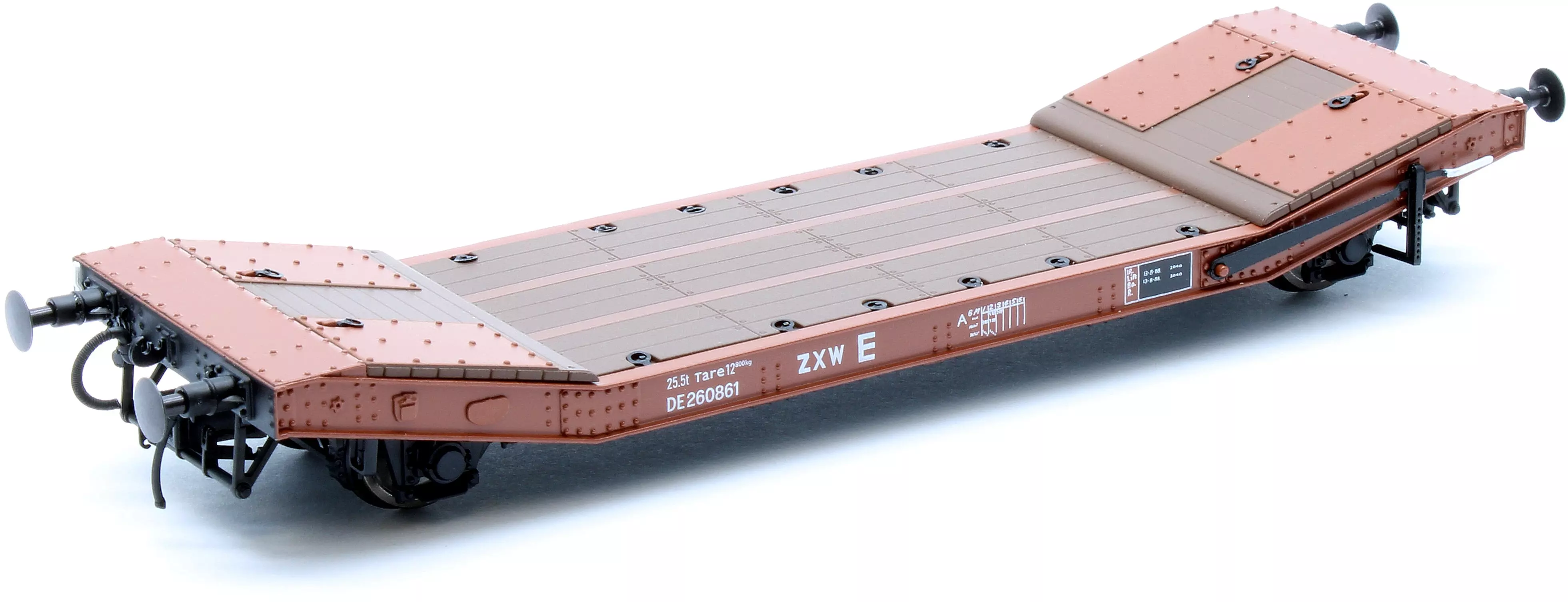Manufacturer catalogue image - please note that pre-release images may be CAD renders or CGI images rather than photographs
Prototype Eras
Era 6 (1967 to 1972) British Rail Blue (Pre-TOPS)
Era 7 (1972 to 1982) British Rail Blue (TOPS)
Era 8 (1983 to 1994) British Rail Sectorisation
Manufacturer description
SPECIFICATIONS
- Fully detailed diecast frame
- Detailed end fittings and pipework
- NEM pocket combined with vacuum cylinder, replaceable with a fully detailed cylinder
- Sprung metal buffers
- Optional EM brake shoes - supplied in detail pack
- Finely detailed etched brass detail parts
- Separately fitted etched brass tie down rings
- Brass bearings with pin point axles
- Fully detailed chassis
A Short History of the Lowmac
The Lowmac (or ‘low-machinery’) family tree can be traced back to the mid-nineteenth century. As the cogs of Britain’s industry turned ever faster – fuelled by the arrival of railways – so the need for larger machinery increased. Transporting this on the country’s often-restricted loading gauge presented a challenge, but altering the infrastructure would have proved costly. Thus the wagon-with-a-well was born: by enabling loads to sit lower, bulky machinery and vehicles could be transported without the risk of embarrassing conflicts with tunnels and bridges.
The design of such wagons was refined over the following decades to accommodate heavier loads, but it was the demands of war that led to their ultimate evolution in the form of the Diagram 173 variant – and it’s these vehicles that our models depict. Constructed at Shildon in 1944, their 25-ton capacity provided the muscle required to transport large military vehicles, and they were quickly drafted to assist in the Allied forces’ liberation of Europe.
After the war, Lowmacs adapted well to life on Civvy Street. So useful were they in transporting awkward loads that British Railways ordered an identical batch (known as Diagram 242/2 and also covered by our models) in 1950. Serving the construction industry and agriculture as well as the needs of the railway itself, many soldiered on into the 1990s, with a few entering the brave new world of privatisation, primarily for moving heavy components around train manufacturers’ premises.
So what can you do with your Lowmacs? Well, they clearly make great bedfellows for ‘Austerity’ engines on wartime traffic – including, of course, our forthcoming 2-10-0s. Peacetime saw them shackled behind a variety of heavy freight and mixed traffic engines and saddled with all manner of awkwardly-shaped cargoes, from farm and engineering machinery to oil tanks and even injured wagons en route to Works for a spot of TLC. Some were modified with an internal frame in the 1960s to support containers, in a precursor to ‘Freightliner’ trains; these were later used as ‘runner’ wagons between bogie flats transporting long sections of rail or concrete beams with an overhang. As we’ve already mentioned, train builders have long realised the value of a Lowmac, while many vehicles today enjoy a quieter life in preservation at sites around the UK.
Their function meant that more often than not post-war Lowmacs would be marshalled singly or as pairs in mixed freight trains – making for an interesting spectacle as well as a useful modelling ruse. And as a decidedly unglamorous member of the railway family, Lowmacs were often overlooked by 20th-century photographers, which meant that much of their regular work went undocumented. This is, of course, the perfect excuse to employ a little lateral thinking when it comes to loading up your ‘Macs; if you can imagine it, they probably carried it – so almost anything goes!
Catalogue listing
Model details
Supplier links are provided for your convenience and do not guarantee that the product is currently available. RailwayModels.uk is not a representative of these suppliers, but may receive a commission when purchases are made through links on this page.
